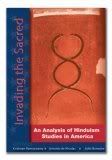
According some experts of Hinduism in American academia, Ganesha’s trunk is a “limp phallus”, Devi is classified as the “mother with a penis”, Shiva is “a notorious womanizer” who incites violence in India, Sri Ramakrishna is a pedophile who sexually molested the young Swami Vivekananda, bindi is a drop of menstrual fluid and the “ha” in sacred mantras is a woman’s sound during orgasm. These scholarly works, peddled by powerful academic cartels who make our own eminent historians look like Winnie the Pooh, have been passed on as interpretations of Hinduism in schools and colleges, thus brainwashing future generations of students. Some of these scholars are also on the editorial committees of encyclopedias and thus misinformation is easily passed around without much dissent.
William Wilberforce, the 18th century British politician in a speech in the House of Commons talks about an incident in which some abusive pamphlets against various religions were released by missionaries in India, but found that the natives were tolerant and “even the grossest imprudence could not rouse them to anger”. When something you hold sacred is denigrated with an agenda, there has to be reaction against it, not the Iranian way of dealing with Salman Rushdie or Sambhaji Brigade’s way of dealing with the Bhandarkar Oriental Research Institute, but by exposing faulty works through research.
That is what Rajiv Malhotra has been doing all these years through his writings on Sulekha. Rajiv Malhotra’s articles on the RISA Lila sparked off many articles which exposed the prejudice behind Hinduism studies. Many Hindu parents who were shocked to read misinterpretations of their religion became activists and the work of this grassroots movement has resulted in the articles compiled in this new book Invading The Sacred: An Analysis of Hinduism Studies in America , edited by Krishnan Ramaswamy, Antonio de Nicolas and Aditi Banerjee. The book, as Sankrant Sanu writes in his review, is also a testimony to rising economic affluence of India and Indians who are now able to use the Internet to challenge established thinking and get books published bypassing the guardians of the establishment.
See Also:Invading the Sacred